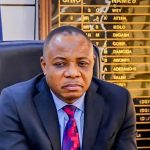ALMOST on a daily basis, accidents happen on the Lagos-Ibadan expressway, Nigeria’s busiest road. For years now, as the government dilly-dallied on the road which is yet to be completed in more than two decades of repair works, vehicular accidents, sometimes accompanied by fire outbreaks that wreak monumental destruction, have been routine. The situation has not significantly changed even with the road finally nearing completion, as motorists accustomed to speeding at the sight of a good road drive recklessly. But while accidents on the road have been typically routine, the Ibadan end of the road, especially, has been in the news for the wrong reasons in recent times. Among other terrible developments, the Soka, Sanyo and Aduloju junctions of the road have become casualty stops where ghastly road accidents harvest human souls on a regular basis.
For instance, last month, many people died and many others sustained varying degrees of injury in an auto crash that happened at the Sanyo axis of the expressway. The accident involved seven vehicles, including three trucks, two Nissan Micra cars, and two private cars. According to Mayowa Odewo, the Public Relations Officer of the Federal Road Safety Corps (FRSC), the incident occurred around 7:49 a.m, claiming the lives of two males and three females. Odewo noted that the Sanyo police station rescued the injured victims, while the bodies of the deceased were deposited at the Adeoyo Morgue on Ring Road, Ibadan. He advised drivers to always practice defensive driving while on the road. Eyewitnesses reported that the accident was caused by the truck driver’s excessive speed and loss of control which resulted in a collision with the Nissan Micra cars and other trucks. Some of the crashed vehicles were towed off the road to allow for the free flow of traffic, while the body of one of the victims was handed over to the relatives by the DPO of Sanyo police station. It later emerged that more people died than was initially reported.
Actually, between January and March this year, as many as 175 crashes reportedly occurred on the Lagos–Ibadan Expressway, resulting in 73 deaths and 393 injuries. Many of these accidents occurred on the Ibadan end of the expressway, or near it. As we noted in previous editorials, the Lagos-Ibadan expressway, a 127.6-kilometre-long expressway, connects Ibadan, the capital of Oyo State, to Lagos, Nigeria’s largest city, and a major route which connects the western, northern and eastern parts of Nigeria. The expressway is the oldest highway in Nigeria, having been inaugurated in August 1978 by the then military Head of State, General Olusegun Obasanjo, and the busiest inter-state route in Nigeria, handling an average of 250,000 Passenger Car Units (PCUs) daily. It also constitutes one of the largest road networks on the continent. However, since its construction and opening for public use in the 1980s, the road had worsened as the government failed to respond to the increasing pressures piled on it following expansions in cities and demographics, and exacerbated by the near comatose state of railway services.
In July 2013, after so many feeble attempts had been made on its expansion and reconstruction, the Goodluck Jonathan government flagged off its reconstruction, harping on the need to reduce the travel time for commuters and to guarantee international air passengers plying the road quick transit to the Lagos airports. The Jonathan government awarded the reconstruction project to Julius Berger Nigeria and Reynolds Construction Company Limited. The suceeding Muhammadu Buhari government, though it made great leaps forward on the road, also failed to complete the reconstruction, which now needs the quick attention of the Bola Tinubu administration.
Apparently, the regular carnage on the road, particularly on the Ibadan end, is due to excessive speeding, inadequacy of infrastructure, and lax enforcement of the law. In this regard, the fact must be stated that the absence of pedestrian bridges at specific points on the road is a massive disservice. It is a no-brainer that the absence of such facilities on a highway exposes pedestrians to danger. However, having bridges in place is one thing, and making use of them quite another. Nigerians have, over the years, shown palpable unwillingness to use bridges, if not utter rejection of the idea of bridges altogether even when it is more than obvious that they were put in place to save lives. Across the country—Ojota and Onipanu bridges in Lagos are good examples—many people fail to use bridges, and only comply at the prospect of prosecution or a fine. The bridge meant to take visitors to the Obafemi Awolowo University on a safe trip to the campus after alighting from buses or cars in Ile-Ife has for years been a mere decoration, shunned by those who are meant to use it. This culture of shunning bridges and making a quick dash across an expressway dotted with speeding vehicles has to stop. And who but the government possesses the power of law enforcement? If those driving against traffic know that jail time awaits them, they will have a change of mind.
ALSO READ FROM NIGERIAN TRIBUNE: Senate approves Tinubu’s $21.8bn external borrowing plan for 2025-2026
Again, if the carnage must be brought to a halt, then regular traffic officers and other law enforcement agents need to checkmate irresponsible motorists and commercial motorcyclists on the road. For years, errant drivers have made countless numbers of citizens to lose life and limb. This terrible state of affairs will continue if the government does not institute a regime of strict law enforcement that brooks no dissidence and gives no quarter. Human life is involved and no step taken to safeguard it can be said to be excessive. Besides, as experience over the years has shown, the Ibadan axis of the expressway could do with more standardized bus stops.
The carnage on the Lagos-Ibadan expressway must stop. Human life is too precious to be wasted so cavalierly as Nigerians have witnessed over the years.
WATCH TOP VIDEOS FROM NIGERIAN TRIBUNE TV
- Relationship Hangout: Public vs Private Proposals – Which Truly Wins in Love?
- “No” Is a Complete Sentence: Why You Should Stop Feeling Guilty
- Relationship Hangout: Friendship Talk 2025 – How to Be a Good Friend & Big Questions on Friendship
- Police Overpower Armed Robbers in Ibadan After Fierce Struggle






